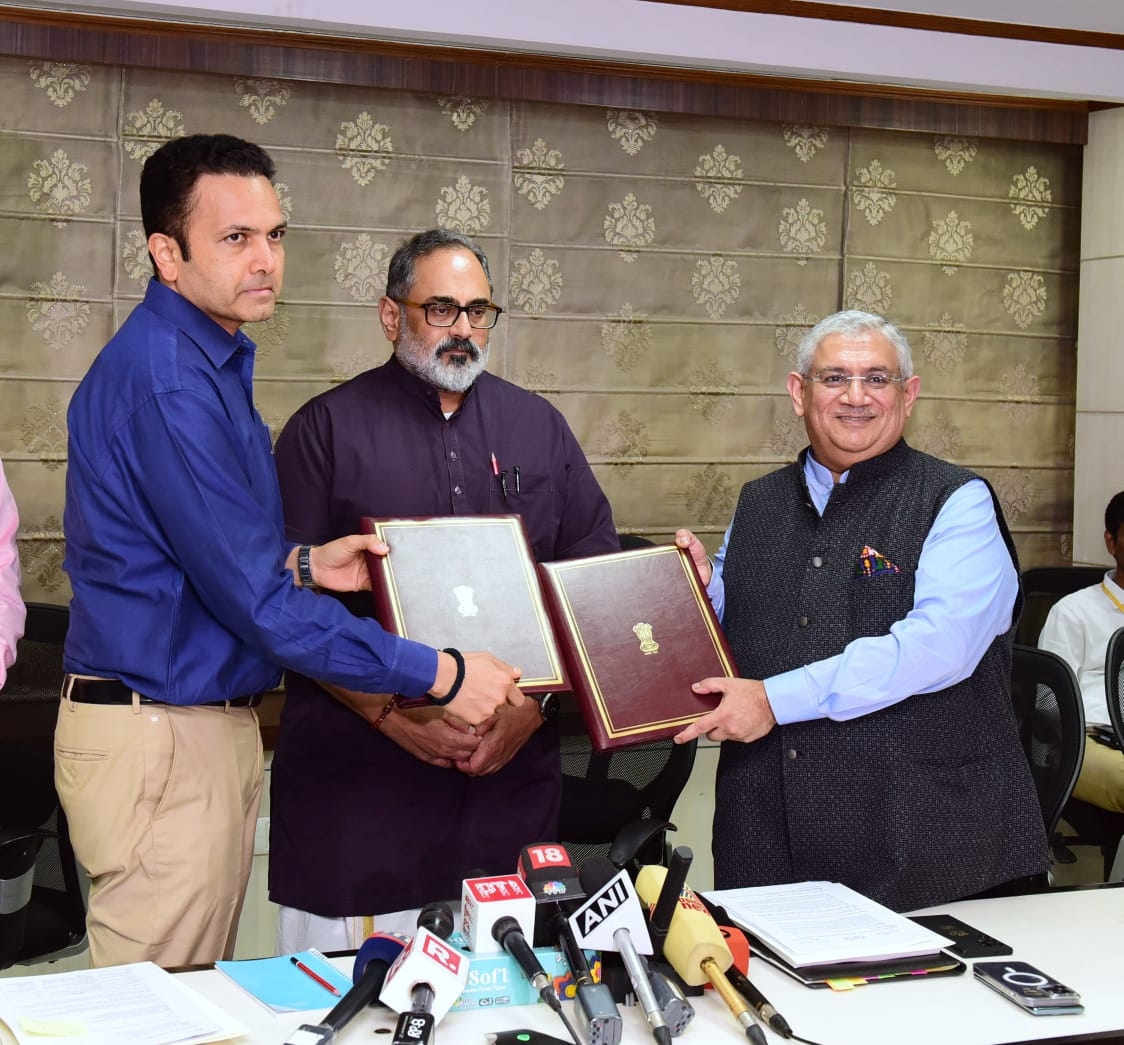MeitY enters into partnership with IBM for AI, semiconductors.
IBM and the Ministry of Electronics & Information Technology (MeitY) have partnered to work together on semiconductors, AI, and quantum technology to influence the future.

Today, IBM and the Indian government inked memorandums of understanding on semiconductors, artificial intelligence, and quantum technology. Rajeev Chandrasekhar, the Union Minister of State for Entrepreneurship, Skill Development, Electronics, and Technology, was in attendance.
The goal of this body of work is to further India's National Quantum Mission, bolster efforts to become self-sufficient in semiconductors, and expedite the country's complete national AI policy.
Four months have passed since the historic joint declaration between the US and India to enhance semiconductor supply chains.
"As the future is shaped by technologies like quantum computing, artificial intelligence, and semiconductors, @GoI_MeitY has partnered with @IBM just four months after the historic India-US joint declaration by @POTUS@JoeBiden & PM @narendramodi ji," stated Rajeev Chandrasekhar.
MeitY will be able to leverage IBM's experience to expand its growth objectives in the semiconductor, quantum, and artificial intelligence (AI) sectors and enhance India's competitiveness.
"IBM will collaborate with #FutureDESIGN startups in the fields of quantum and artificial intelligence, and support the #FutureSkills program with @NIELITIndia," Chandrasekhar continued.
According to him, working with IBM will greatly increase the capabilities of the Indian semiconductor, artificial intelligence, and quantum innovation ecosystems.
"This is certainly a very important day," stated Union Minister Rajeev Chandrasekhar, "because three of the four technologies that will shape the future of tech and innovation in the coming years—AI, quantum computing, and semiconductors—represent for us tremendous opportunities for our academic ecosystem, for startups, and for the innovation ecosystem in general. And of course, there is the broader opportunity of creating global standard talent in India that can take advantage of the opportunities in Quantum, Semiconductors, and AI.”
It is intended to enhance and quicken India's innovation in these fields that IBM would collaborate with IndiaAI, ISM, and C-DAC under the strategies that center on talent development, interacting with ecosystems, and quickening R&D efforts in semiconductors, AI, and quantum.
In order to support India's scientific, commercial, and human capital development in this technology, Digital India Corporation plans to work with partners to establish a world-class national AI Innovation Platform (AIIP) for India. This platform will be dedicated to AI skilling, ecosystem development, and the integration of advanced foundation models and generative AI capabilities.
IBM would collaborate with India Semiconductor Mission (ISM) on a semiconductor research center as a knowledge partner. In order to promote innovation in semiconductor technologies including logic, advanced packaging and heterogeneous integration, and advanced chip design technologies employing updated infrastructure, IBM may share with ISM its knowledge on intellectual property, tools, initiatives, and skills development.
Building competency in quantum computing technology, applications in areas of national interest, and a skilled workforce in quantum computing are some of the ways IBM and the Centre for Development of Advanced Computing (C-DAC) will investigate opportunities for collaborating to support the advancement of India's National Quantum Mission.
"This partnership reaffirms our dedication to serving as India's reliable partner in advancing its innovative capacities. India's digital transformation and economic growth will depend heavily on supporting the government's efforts to develop infrastructure, improve human capital, and create knowledge in these three areas of technology, according to Shri Sandip Patel, Managing Director, IBM India & South Asia.
President Joe Biden and Prime Minister Narendra Modi reaffirmed earlier in June their view of India and the US as two of the closest allies in the world: a partnership of democracies facing the twenty-first century with optimism, aspiration, and confidence.
President Biden and Prime Minister Modi both stated that strengthening our collaboration will be largely dependent on technology. The Initiative on Critical and Emerging Technology (iCET) launch in January 2023 was praised by the leaders as a significant turning point in US-Indian ties.
The Semiconductor Supply Chain and Innovation Partnership Memorandum of Understanding was signed, and PM Modi and President Biden celebrated it as a major development in the coordinating of semiconductor incentive schemes.
Research, talent, skill development, and commercial opportunities will all benefit from this. The leaders praised Micron Technology, Inc.'s statement that they would work with the Indian government to construct a new semiconductor assembly and testing plant in India, with an investment of up to USD 825 million.
To improve the supply chain's diversification for semiconductors, Applied Materials plans to open a Semiconductor Centre for Commercialization and Innovation in India.
Through its "Semiverse Solution," Lam Research will train 60,000 Indian engineers, helping to expedite India's workforce development and semiconductor education objectives.
Public-private Joint Task Forces on the creation and implementation of Open RAN systems as well as cutting-edge telecoms research and development have been established by the US and India.
To promote collaborative research on advanced wireless technologies, artificial intelligence (AI), and quantum technology, the Joint Indo-US Quantum Coordination Mechanism was formed.
Collaborative efforts on generative AI and other trustworthy and responsible AI will advance worker initiatives, AI education, and business prospects.
Bharati Web







